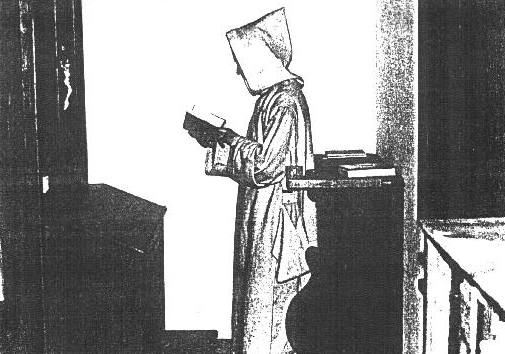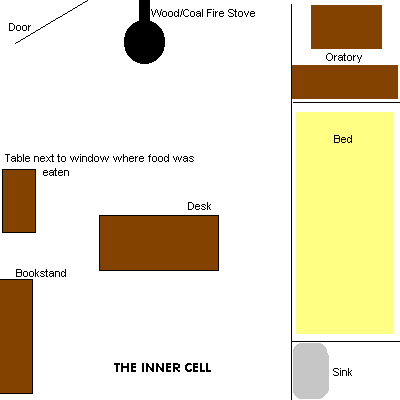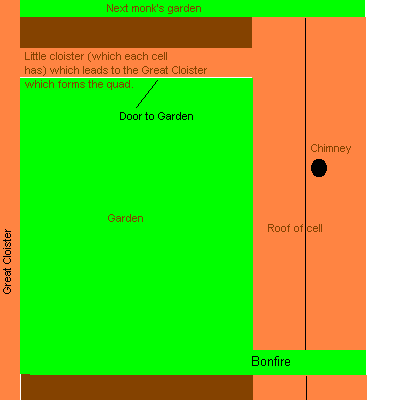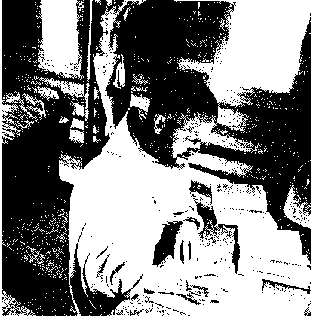
This is no more than a single choir chair next to the bed. All the Office is said here in solitude except matins, lauds and vespers (which is said in the church); yet ALL the Office of Our Lady is said in cell.
Memories of Carthusian Life
I got up at 06:00. I had the use of a small plastic alarm clock. Plastic is not so common around the monastery, and I am thankful for that. My head was bald. We had our heads shaved every two weeks by one of the brothers. This was part of the culture. The brothers could grow beards (without the moustache), but the fathers, or those to be so, (as I) could not. A younger brother had taken on this job, and he used an electric razor. He was keen on this job and dug deep into the skull's skin to leave a smooth finish as possible. This meant washing in the morning was easier. Just put the head under water, scrub and then dry.
Prime was the first thing I did in the day. We prayed all the Divine Office twice. Once with the regular Office, and then with the Office of Our Lady. So, we prayed the Office of Prime, then we prayed the Office of Prime of Our Lady. This was the same with all the Offices. (Each Office is a time set aside for certain prayer - liturgical prayer - they vary in length from about 15 minutes to 3 hours and are spread over the day.)
The Carthusians have their own liturgical prayer books. They compose, publish and print them for themselves. They are very well put together and treated with respect. It is a custom to never leave a book open when not attending it. This helped keep them in good condition. (Coming from a culture of cheap paper backs I found this custom a chore to get used to.) The books are various. They have the large Psalter in Latin. A huge book shared between 3 in choir. The gradual - for mass in Latin. The vespers book and other Divine Office books. The hymns and psalms and antiphons were in Latin (and the Mass); the readings and intercessions were in English. In cell there was one book for the canonical Office, and one for the Office of Our Lady.
We washed next to the sink in the inner cell. There is no hot water supply, so water is heated on the coal and wood fire stove using an old watering can. There is no heating apart from this stove. Electricity gives lighting and a razor point. The Office is prayed in the
Oratory

This is no more than a single choir chair next to the bed.
All the Office is said here in solitude except matins, lauds
and vespers (which is said in the church); yet ALL the
Office of Our Lady is said in cell.
Throughout the day the bells rang to tell us the time and what to do next. For each Office a warning bell rang 5 minutes before to tell us to get ready. On the second bell we were to start. The sacristan's job was to organise the church. When an Office was to be said in the church, he got the church ready and started the bell pulling. As each monk arrived at the church, he took over the ringing of the bell. When all had arrived the Office started at the Priors command. (This is a knock on the wooden stall.)
All this is done in the monastery, and most of it in cell. Each monk's cell consists of a 2 up and 2 down building with a garden. There is a small cloister from this building to the Great Cloister. The Great Cloister connects all the cells to the church. Within the inner cell the liturgical prayer, study, sleep, eating and drinking is done.
Here are some plans to explain
the lay out of the cell.
![]() Aerial
Plan of the inner cell
Aerial
Plan of the inner cell

![]() Side view
of cell.
Side view
of cell.

![]() Aerial
Plan of cell including the garden.
Aerial
Plan of cell including the garden.

The monks talk to each other twice a week. This is after lunch on Sunday and for the duration of a 3 - 4 hour walk on Monday. Strictly the brothers, fathers and novices all remain separate, but with so few at our monastery, all shared the one walk. Family could visit once a year for 3 days. There is a house in the grounds where women and men can stay. The walk was different most weeks and was only put off with severe weather. If it was, it was postponed to the day until the weather was passable. The walk was not omitted. We walked in pairs, each pair a few meters apart, and swapped every 20 or so minutes to walk with another. We always wore the habit on the walks and must have appeared a weird bunch to those who saw us. Once a year we went on a big walk that took just about the whole day. For this a local person drove us in a minibus to some deserted place. We had a picnic for this one and took our prayer books. We were not to leave the monastic grounds for any other purpose. In fact, we were never to leave the cell except to go to the church 3 times a day. The cell was the place of our learning - in solitude - it was there we were to live and die, and here they did.
I found that there was not enough time for me to do the manual work I wanted to do. In the morning, I had three-quarters of an hour to get stuck into some gardening. By the time I got myself prepared for this, 5 to 10 minutes had already elapsed. Having got very dirty I needed to give myself 10 minutes to wash at the end. I would have liked more time for the gardening. Lunch time was always welcome. This started with soup, then a main course without meat, then biscuits and some kind of pudding. The greatest enjoyment was the homemade cider. This was potent and I could have one litre a day. After the novelty of the cider wore off, I mostly stuck to having tea. The cider made the rest of the day tiring. Occasionally though I looked forward to a tiring day!
Study

Study after lunch, gave a refreshing opportunity to use the
head. A greater part of the time I spent studying was
dedicated to learning Latin. The evening times were the most
prayerful for me. This was because I would not see anybody
else until the night vigils. It was a long quiet period. It
was the time when feelings of my life found an opportunity
to express themselves. Feelings to be shared with God. It
was the healing time.
The night vigils started at 11.30 pm. It could be very cold. There was time to observe the sky on the way to the Church through the cloister. There was no heating in the Church, but the chanting and the meaning of the chant and readings kept the body warm. The night vigils invited me to see every new day as something very wonderful. And so the days were.
For no-frames browsers: Back to main menu. (or use 'back' button.)
To view this page as intended with frames, click here